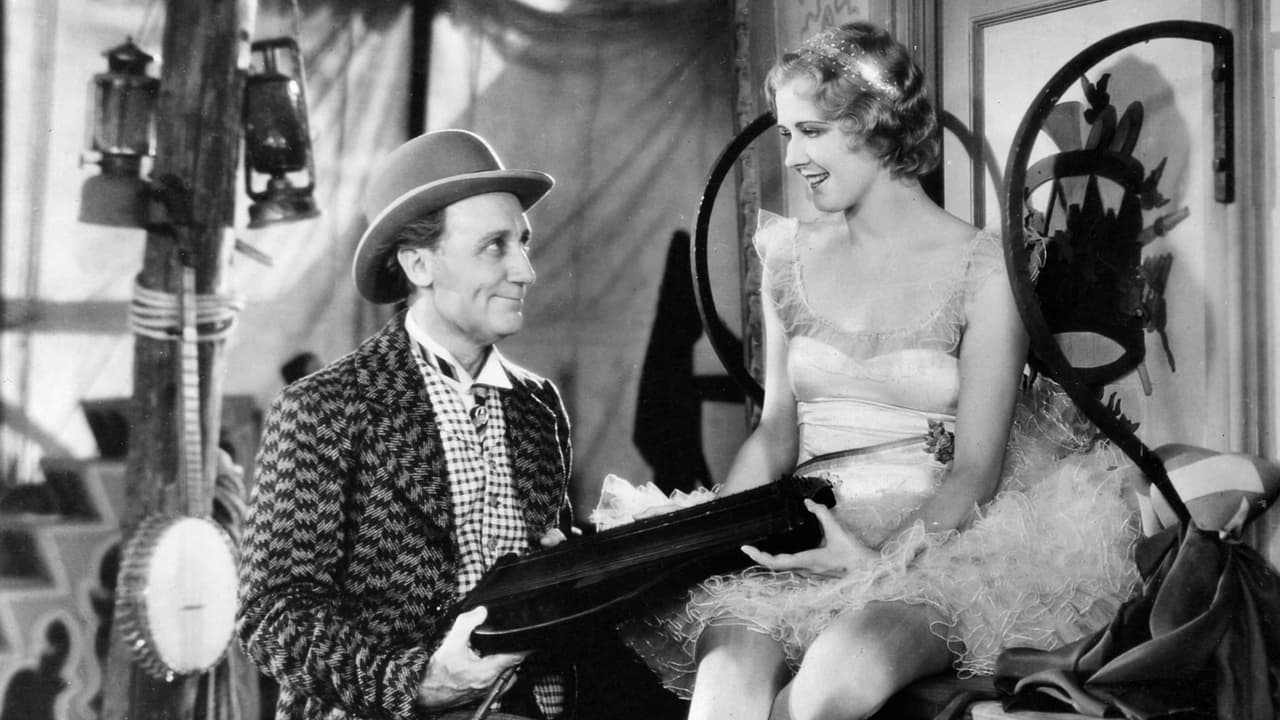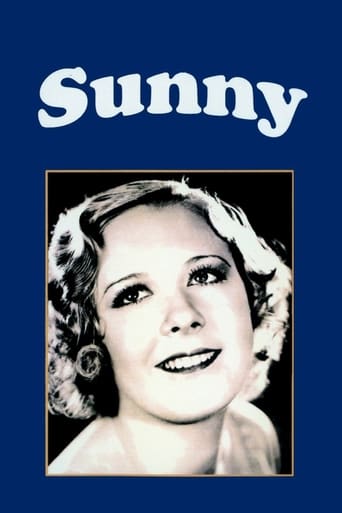

Such a frustrating disappointment
... View MoreExcellent, a Must See
... View MoreExcellent and certainly provocative... If nothing else, the film is a real conversation starter.
... View MoreA clunky actioner with a handful of cool moments.
... View MoreSunny (1930) ** (out of 4) The second of three pictures that Broadway star Marilyn Miller would make at First National. This one here has her playing Sunny, a girl working at a circus who sneaks on a boat heading for America so that she can find a better life. Along the way she ends up marrying Tom (Lawrence Gray) but their hopes for a good future are challenged. SUNNY isn't nearly as good as Miller's previous film (SALLY) but fans of the actress will probably still want to watch it and especially when you considering how few movies she made due to her early death. The biggest problem with this film is actually the sound quality. I'm really not sure what happened during the making of this movie but the sound quality is downright awful from start to finish. It doesn't seem to be an issue with the discs today because if it was the case of a movie just having a poor soundtrack then it would be uneven from reel to reel. This film sounds the same from start to finish so this leads me to believe it was something done during production. Every time someone talks it's as if they're standing in a cave to where we get an echo as well as some hiss. This is annoying at first but overtime you just get used to it. Miller is without question the real reason to watch this film as she has a certain charm and energy that was made for the big screen. Gray, on the other hand, comes across pretty bland and boring as does the majority of the supporting cast, although BRIDE OF FRANKENSTEIN fans will get a look at O.P. Heggie in a role here. SUNNY also features some rather mediocre music and songs, which certainly doesn't help matters.
... View MoreThe Vitaphone/Warner Brothers folks were the foremost studio when it came to sound. Because of that, I was a bit confused when I watched "Sunny" as the sound was really, really bad. It seriously sounded as if the sound was recorded in a telephone booth--and you were outside trying to listen! Fortunately, the version shown on Turner Classic movies IS captioned and I strongly advise you to turn on your television's captioning for this film. You'll need it! "Sunny" stars Marilyn Miller--a very talented Broadway star who only made three early sound films before dying at age 37! The film begins with Miller feeling fed up with life in the circus and she disappears dressed as a man. She then stows away on a ship bound for America--not realizing her father is in pursuit. He is determined that she should marry a rich but dreadfully dull Brit--who Marilyn keeps referring to as 'the fish'. Can she manage to make it to America or is it an unhappy marriage to a weenie instead? While this film is a bit antiquated, you can clearly see the formula that would become the norm in future musicals of its type. The film features a few songs (actually not that many for a musical) and several dance numbers from Miller. And, true to the formula, a bit of comic relief to keep the overall mood very light. If it weren't for the bad sound, I'd strongly encourage you to see it. In its present form, however, it's one you might just want to skip.By the way, in the wedding scene on the ship, how did they get a bridal gown for Miller and all the bridesmaids? After all, they were in the middle of the ocean and the wedding was unplanned!!
... View MoreThis is the closest we'll ever get to seeing the wonderful Marilyn Miller on stage in her role as Sunny. The title song and the memorable "Who" were some of the most popular tunes in the late '20s, as played by George Olsen and His Music (who not only played in the Broadway production but cut a record with those songs on it.) It's rather interesting that WB made this movie right at the end of the musical era: had the stock market crash happened two years later, this might well have been an color production. It was certainly intended to be a blockbuster, and if only for that reason it's worth watching -- to see what constituted "popular" in a different era.
... View MoreAfter scoring a hit in First National's top grosser for 1930 - "Sally", there was no question that charismatic Marilyn Miller would be asked to star in her other huge Broadway success of the 1920s, "Sunny". On the stage it opened spectacularly with a magnificent circus, Miller making her entrance in a tutu of gossamer and spangles and riding bareback on a magnificent white horse. After that it was one standing ovation after another and a lot of critics found it superior in every way to "Sally".But something happened to the movie. The bubble had burst since "Sally" had been released and people had cooled towards the musical. Gone was the showy color in which "Sally" had dazzled audiences - it was four times as expensive as black and white to film and it also generated a torrid heat caused by the extra lights so Miller was not at all unhappy to be working in black and white. Another thing, Jack Warner felt the public were sick of long production numbers that slowed the story down and when players broke into song at inappropriate moments so comedy was given more prominence.Sunny (Miller) billed as the greatest bare back rider in Britain is loved by Wendell-Wendell, a typical fuddy duddy Englishman, but she has never forgotten Tom (Lawrence Gray), a boy she knew long ago and with whom she has just become reacquainted through the lilting duet "Who". Knowing that he is sailing that afternoon, Sunny disguises herself as a boy and decides to stowaway. It is clear that there is a heavier influence on comedy here, much more than in "Sally", with gangling Joe Donahue, dithering O.P. Heggie and whiney Inez Courtney. Tom is engaged to snooty Miss Manners (Barbara Bedford) and Sunny, who is in hiding in Jim's (Donahue) cabin makes her feelings known in the plaintive song "I Was Alone" - then with the throwaway line "let's have some fun" launches into a terrific dance of all the different styles of tap she made famous. She is wonderful and adorable and it is easy to see why she had Broadway audiences eating out of the palm of her hand. To help Sunny land in the States without a passport they arrange for her to marry Jim (in a magnificent ship board wedding)- in name only - even though he has left his girl, Weenie (Courtney) back in England. Back in America, Jim gets the gym he has always wanted, Sunny is hopeful of eventually marrying her Tom and together she and Jim do an eccentric dance to "When We Get Our Divorce". Of course things get even more muddled before they are smoothed out and Miller performs the balletic "The Hunt Dance" before Tom comes to his senses and they embrace on the gravel drive.First National spent a lot of money on the sets - the shipboard wedding, the gymnasium and an ornate ballroom for the climatic dance. Marilyn had thought Jack Donahue, who had starred with her on the stage, would repeat his role in the movie version but he was close to death as a result of alcoholism and so his younger brother, Joe, took his place.
... View More